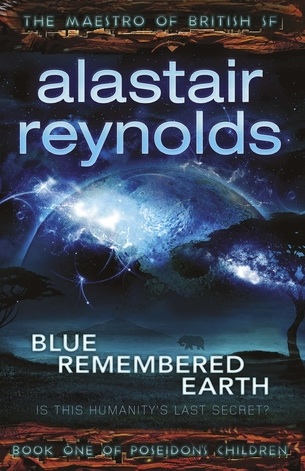Why you can trust 12DOVE
Kicking off a new trilogy of cosmic exploration
Authors should be kept hungry - it aids creativity. It’s well known that to be a proper writer, you have to go and live in a damp Parisian garret, where you eat only occasional leftovers from the café below and embark on a doomed love affair with a troubled soul who’s involved in the seedier end of showbiz.
Gollancz evidently haven’t read the script, because in 2009 the publishers agreed to pay Alastair Reynolds £1 million for 10 books, a sum big enough to attract the attention of the posh newspapers. That’s it, then: the “Maestro Of British SF”, as the cover of Blue Remembered Earth now dubs him, is obviously going to rest on his laurels, right?
Not so fast. Speaking to SFX , Reynolds reflected on what financial security has brought him: specifically, he’s able to commit to a massive trilogy without finding himself “constrained”. And, to judge by Blue Remembered Earth , the Poseidon’s Children trilogy is certainly going to be a magnum opus as it follows humankind’s expansion into the solar system and then the galaxy beyond.
The first novel, which works as a standalone, is set in the 22nd century on an Earth badly affected by global warming. Yet far from being destroyed, humanity has somehow negotiated the shifts in climate. The new norm is considerably hotter than 200 or 300 years previously, but new technologies have kept the sea at bay. Moreover, because this is a world of constant surveillance, violence has all but been eradicated. Africa is now a tech-savvy and developed continent - but not at the expense of older powers such as the USA.
Happy days all round then, and thus not exactly the ideal setting for creating dramatic tension. Except that humankind is also in the midst of colonising the Moon, Mars and other spheres in Earth’s immediate vicinity. For those with a sense of adventure, such as Eunice Akinya, matriarch to a powerful and rich African family, room to roam and adventure beckon. Yet grand families typically treat mavericks with caution, owing to their capacity to cause PR disasters. So when Eunice dies, one of her grandchildren, Geoffrey, is sent to the Moon to protect the family name. Even though his sister, artist Sunday, lives on our satellite, it’s not a task he relishes. Geoffrey is an elephant researcher, a scientist; indeed, both children are off at a tangent from those members of the family concerned with money and power. What should be a simple, discreet task proves to be nothing of the kind. Instead, following clues left by his grandmother, Geoffrey and Sunday find themselves unwillingly drawn into the heart of the family business, and also into debates over mankind’s place in the universe.
In truth, there are moments when you have to suspend your disbelief a little as Reynolds chucks around false leads and unexpected revelations to drive his plot forward. Essentially, this is narrative as a treasure hunt, and there are moments when Reynolds appears to struggle with the self-imposed technical problems this causes him.
At other points though, the sheer quality of his writing reminds you why contemporaries such as China Miéville hold Reynolds in such high esteem. The opening prologue, involving Geoffrey and Sunday happening on a “death machine” military robot, is a mini-masterpiece in sustained tension. Similarly, scenes set on a part of Mars where machines endlessly mutate in order to survive are as dark as they are fascinating.
Most of all, though, it’s good to see Reynolds embark on something so self-consciously big again. As he proved with the gothic-tinged Revelation Space sequence, Reynolds does epic with aplomb. That Blue Remembered Earth is also convincingly optimistic, life-affirming SF is a measure of Reynolds’s versatility and development as a novelist.
Jonathan Wright
Read more of our book reviews .
SFX Magazine is the world's number one sci-fi, fantasy, and horror magazine published by Future PLC. Established in 1995, SFX Magazine prides itself on writing for its fans, welcoming geeks, collectors, and aficionados into its readership for over 25 years. Covering films, TV shows, books, comics, games, merch, and more, SFX Magazine is published every month. If you love it, chances are we do too and you'll find it in SFX.

Superman star Nicholas Hoult reveals the "magic" moment when David Corenswet first flew onto set as the Man of Steel: "I felt like I was witnessing the magic of cinema"

Jurassic World's Scarlett Johansson says Rebirth will make the franchise scary again – and one behind-closed-doors scene already proves she's not bluffing












